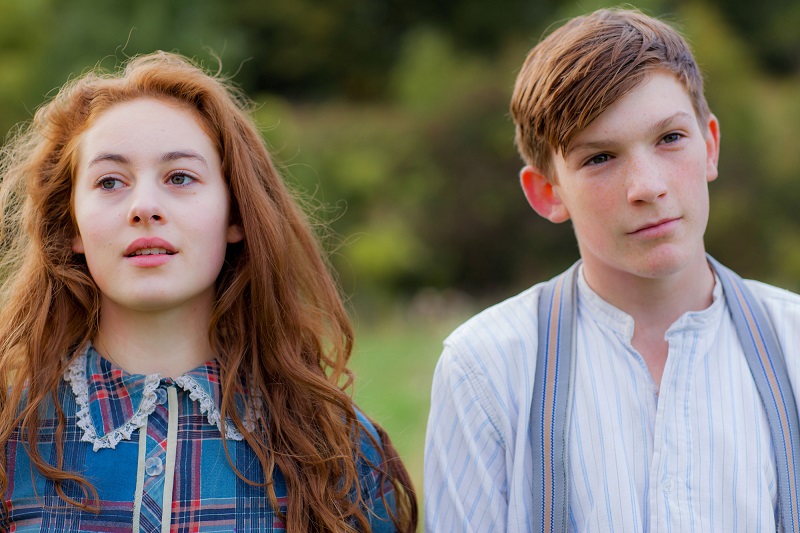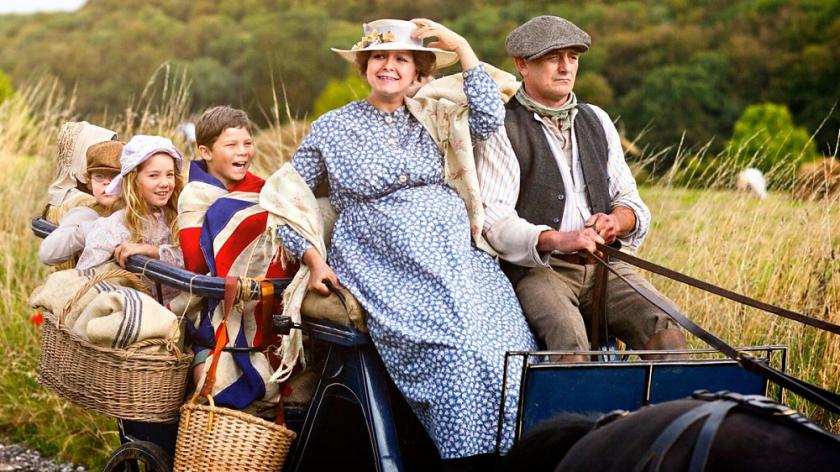For the final instalment of its season of 20th-century classics, the BBC left the world of fiction behind and took a Rosie-tinted amble along the leafy byways of Laurie Lee’s youth. The first part of Lee’s autobiographical trilogy is much the most read. Sales of six million means Cider with Rosie has a lot of fans who will have watched this dramatisation anxiously fearing the worst.
They can rest easy. This amiable, elegiac adaptation’s commitment to honesty extended to filming in Slad, the Cotswold village where the author grew up – and, in a touching final shot, now rests in a graveyard overlooking his beloved valley. Although the motor car has long since linked it up to the rest of the world, director Philippa Lowthorpe made much of Lee’s “strange new land, dizzy with scent and burned all over with hot white flowers”, of the pastures which lushly roll and seductively tumble in the sunlit summers of the author’s intoxicated memory. The weather seems to have behaved for the shoot. It looked sufficiently hot and, where appropriate, wet. In one frosted winter scene young Loll and pals skated on the iced-over pond where, “an unexploded bomb”, in summer he later peeped at a naked Rosie sloshing about in the water - a forgiveable invention, given that Lee invented much of his own memoir.
There was Lee’s stumbling journey towards the gates of carnal knowledge
The drowsy Gloucestershire accents had the firm smack of authenticity, both in Samantha Morton excellent as the loving matriarch of the teeming Lee brood, and in younger actors, some locally sourced. Meanwhile Timothy Spall recited juicy clumps of purple prose in honour of Lee’s intention to “record what I had seen for others before it was lost and gorn forever”. Rarely has the intrusion of a voiceover been less unwelcome, to string together a sketchy ragbag of tall tales and fond fancies that grew plump with improbability in Lee’s recollection.
True to Lee’s loose narrative structure, which flits between episodes like a bee among flowers, Ben Vanstone’s selective script never settled anywhere for very long. Some incidents barely mentioned in the book bloomed into scenes. Others shrank to fall in with the notion of a dramatic arc. Despite the odd coarse segue where one incident jagged to another, there was little attempt to unfurl lumps, or make sense of narrative culs-de-sac. A man was killed in the village and, unlike in Midsomer Murders, that was the end of it. The army fired at clouds to break the heatwave. On his violin Loll scraped “Danny Boy” at the village feast. Five hopeful boys tried to overwhelm a girl in the woods. Loll flew down the lane on the back of his mother’s bicycle (he is only a witness to her pedalling in the book).
 Normally in dramas about childhood there comes a mournful moment when the story catapults several years forwards and, in a blink, a child actor hands on the role to a teenage replacement. For once that didn’t happen here in a script which, honouring the original's lack of linearity, dashed back and forth between the last year of the Great War and several years later. “Remembering is to relive,” said Lee, “to be in the same moment all over again.” And he saw his younger self standing over his sister's grave, which he himself barely dodged as a boy. As young Laurie, plainspoken and inquisitive, Georgie Smith was by no means out-Lolled by the older sloe-eyed Archie Cox (pictured above with Ruby Ashbourne Serkis as Rosie).
Normally in dramas about childhood there comes a mournful moment when the story catapults several years forwards and, in a blink, a child actor hands on the role to a teenage replacement. For once that didn’t happen here in a script which, honouring the original's lack of linearity, dashed back and forth between the last year of the Great War and several years later. “Remembering is to relive,” said Lee, “to be in the same moment all over again.” And he saw his younger self standing over his sister's grave, which he himself barely dodged as a boy. As young Laurie, plainspoken and inquisitive, Georgie Smith was by no means out-Lolled by the older sloe-eyed Archie Cox (pictured above with Ruby Ashbourne Serkis as Rosie).
Such continuity as there was came from the home – the solitary vigil of Annie Lee, abandoned for good by her feckless husband – and the school, where the village children learnt barely anything from the martinet Miss Crabby (Jessica Hynes). And then there was Lee’s stumbling journey, alluded to in the title, towards the gates of carnal knowledge. Ruby Ashbourne Serkis dispensed those “ciderous kisses” with aplomb. "Never to be forgotten, or ever tasted again..." No matter than in the book it's the first taste of cider he mourns, not Rosie.















Add comment